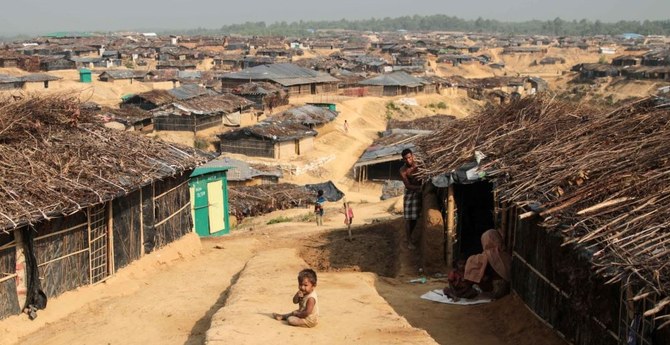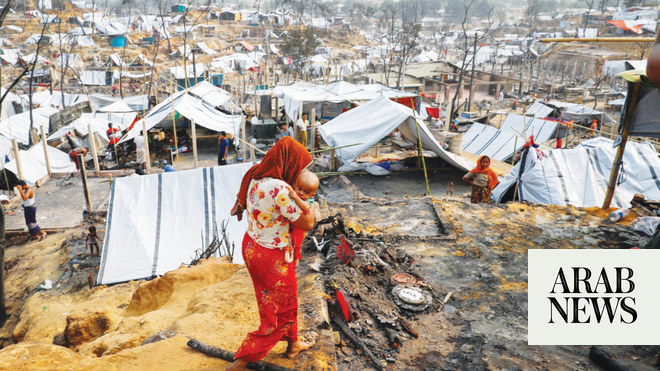
Myanmar’s military-led initiative to repatriate Rohingya refugees from Bangladesh has drawn skepticism and criticism from human rights campaigners. The pilot project, aimed at repatriating about 1,000 Rohingya refugees, has been labeled a mere PR campaign. Concerns over the transparency of the verification process and the absence of guarantees for the Rohingya’s safety and citizenship rights have cast doubts on the initiative.
The plight of Rohingya refugees is becoming an urgent humanitarian crisis. Nearly 1 million Rohingya Muslims sought shelter in squalid camps in Bangladesh after fleeing a military-led crackdown in Myanmar and their population seems to be increasing, adding more pressure on Bangladesh to find speedy — and imperfect — solutions.
Despite recent efforts to encourage voluntary repatriation, Rohingya refugees remain hesitant due to concerns about their security, citizenship and the conditions they would face upon returning. Rohingya rightly demand the need for comprehensive solutions that prioritize safety, recognition of their citizenship rights and dialogue to address the historical animosity and abuse they have endured.
The recent visit of a delegation from Myanmar to Bangladesh’s Cox’s Bazar district, where the biggest camp shelters the largest refugee population in the world, marked the initial step in the pilot repatriation project. The delegation aimed to interview potential candidates for repatriation as early as the following month. However, the verification process lacked transparency and failed to address the demands of Rohingya refugees.
Most concerning was the lack of commitment from the Myanmar junta regarding the restoration of Rohingya citizenship and rights. The junta also had not assured returnees the freedom to return to their original homes or grant them freedom of movement. The ongoing genocide further erodes trust, with reports of arrests and sentencing for those who return without official permission or attempt to seek refuge elsewhere.
The planned repatriation has also faced criticism from Rohingya diaspora groups, which view it as a token gesture coinciding with the International Court of Justice resuming the genocide case against Myanmar’s military rulers. The Arakan Rohingya National Alliance condemned the repatriation as an attempt to create a false narrative of sincerity while addressing only a minute fraction of the refugee population.
Additionally, more than 200 civil society organizations expressed their condemnation of the UN’s involvement in the process. They questioned the UN’s decision to facilitate the Myanmar delegation, emphasizing that the current conditions in Myanmar are unsafe for the Rohingya community. While the UN High Commissioner for Refugees defended its support for efforts that could lead to verification and eventual return, it acknowledged the ongoing dangers faced by Rohingya in Myanmar.
Rohingya that were selected for the repatriation have themselves expressed reservations about returning to Myanmar, as they fear being confined to camps once again. Their visit to Rakhine state was part of an initiative to assess the preparations for resettlement. However, the refugees have questioned the adequacy of these arrangements and stressed that they will only return permanently if their safety is guaranteed and their citizenship rights are recognized.
Oli Hossain, one of the Rohingya refugees who visited Rakhine state, emphasized the desire to reclaim their land and rebuild their homes instead of being confined to camps. He reiterated that citizenship and the restoration of their rights are essential prerequisites for their return. Similarly, other refugees rejected the proposed national verification cards offered by Myanmar, seeing them as a means to further marginalize the Rohingya and deny their rightful status as citizens. Changes in village names in Rakhine state have only added to their concerns, indicating a deliberate attempt to erase their presence and historical connection to the region.
The UNHCR stresses the significance of voluntary repatriation and informed decision-making. The agency maintains that engaging in dialogue with Rohingya refugees is crucial to ensuring their well-being and allowing them to make informed choices about their return. Such visits to their homeland enable them to assess conditions firsthand and contribute to informed decision-making.
The repatriation plan agreed upon in 2017 has made almost no progress. Myanmar’s military, which has historically denied citizenship to the Rohingya and subjected them to mistreatment, has shown little willingness to accept them back until recently. The military chief, Min Aung Hlaing, dismissed their identity as “imaginary” and played a significant role during the 2017 crackdown.
Attempts to initiate repatriation in previous years have failed due to refugees’ justified fears of violence. The UNHCR recognizes the Rohingya’s inalienable right to return but emphasizes that it must be voluntary, safe and dignified. No refugee should be forced to return under unfavorable conditions.
The international community, including organizations like the UNHCR, must continue to play an active role in facilitating dialogue and ensuring the well-being of the Rohingya. Efforts should focus on addressing the underlying causes of the crisis, fostering a climate of reconciliation and advocating for the recognition of Rohingya citizenship rights.
More than 200 civil society organizations expressed their condemnation of the UN’s involvement in the process.
Dr. Azeem Ibrahim
The skepticism surrounding Myanmar’s repatriation plan for Rohingya refugees underscores the urgent need for transparent, genuine and comprehensive efforts to address their plight. The verification process must be conducted with transparency and take into account the demands and concerns of the Rohingya community. Restoring citizenship rights, ensuring the safety of returnees and addressing the ongoing genocide are critical steps toward building trust and facilitating a sustainable repatriation process. The international community must remain vigilant and exert pressure to ensure the rights and well-being of the Rohingya are protected throughout this challenging process.
Dr. Azeem Ibrahim is director of special initiatives at the New Lines Institute for Strategy and Policy in Washington, DC, and the author of “The Rohingyas: Inside Myanmar’s Genocide” (Hurst, 2017). Twitter: @AzeemIbrahim












